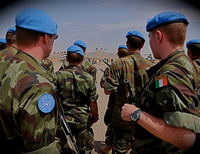Poland assumed the six-month rotating presidency of the European Union at the beginning of July, at a time when the union's Common Security and Defense Policy (CSDP) was in need of a boost. With military cooperation among the 27 member states high on Warsaw's agenda, Poland's EU presidency might provide the needed stimulus to get EU defense back on track. However, recent disputes within the EU over the NATO-led intervention in Libya, as well as resistance from London, could impede Warsaw's attempts to accelerate Europe's defense integration.
According to Polish Defense Minister Bogdan Klich, the Polish presidency has four ambitious military priorities: focusing more attention on EU Battlegroups, formed by troops from its member states; bolstering the organization's military capacities via reform of the EU command structure; improving the EU's relations with NATO; and engaging in a strategic dialogue with its partners from the EU's Eastern Partnership initiative, namely Ukraine, Belarus, Moldova, Azerbaijan, Armenia and Georgia.
As part of the country's efforts aimed at further developing the Battlegroups, Poland, Germany and France have recently signed an agreement to set up a joint Weimar Battlegroup by 2013.

